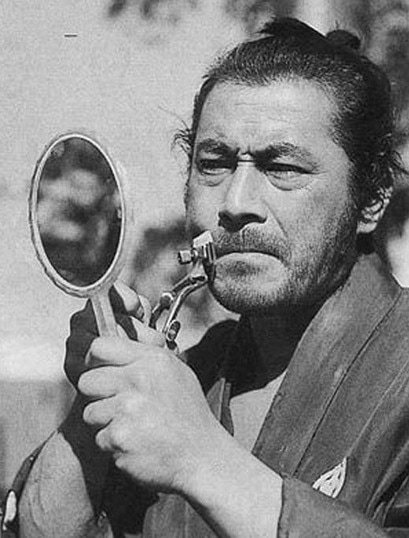 The legendary Toshiro Mifune grooming himself before stepping onto the set The legendary Toshiro Mifune grooming himself before stepping onto the set Sometimes good things can be found in the most unlikely places. For the best shave in my city, I go to the hospital. The Himeji Junkanki Centre Hospital, to be exact. This mysterious facility hides in the hills south of the train tracks and is only known to people with heart conditions, poor blood circulation or a poor sense of direction. Down a hallway, in a warren of hallways, past its blood drawing room, stomach camera room, X-Ray closet, a cafe of philosophical waitresses and a kiosk which sells everything for double-and-a-half, at the very end, stands a small barber shop. The sign over the door should say ‘Style with a smile’ or ‘Life is short, but our buzzcut is shorter’. Instead it just says “Barber”. On a busy day the wheelchairs are backed up around the corner. Waiting time is short, however, on account of the mostly elderly patrons who don’t have much hair to speak of. It's not the cut they come for anyway; it’s the ‘old school’ shave. I haven’t been around long enough to know what ‘old school’ means, but to recline in a classic Takara-Belmont barber chair with the tang of Tahitian Lime hair tonic in your nostrils and feel the liquid smoothness of an Iwasaki straight razor rolling across your chin and cheeks, is to savor one of the great intimate pleasures of Japan. A shave at the Junkanki Centre Hospital Barbershop is also my chance to step out of a lightspeed lifestyle for fifteen minutes, to drift off into a hot-lathered land where the hustle of a hospital sounds like a far-off cocktail party through which white-uniformed stewardesses push trolleys of clinking martinis and...be brought back to earth by the jolt and jerk of the chair, a brisk shampoo and a scalp rub which leaves me wondering where I am, what time it is and... There are two staff; an elderly man with a voice that sounds like a food processor full of thumb tacks and a middle-aged woman with a voice that doesn't. They share the glass shelves of scalp tonic, tubs of baby powder and hair wax, double-edged razors, clippers, a steam oven filled with hot towels, and a transistor which radio plays Okinawan ballads in the morning and baseball in the afternoon. For some reason it’s the woman who always cuts my hair and shaves me. She tells me she has two young sons and two jobs. I know she works hard and her shoulder massages make me remember it. I’ve often wondered if her second job is dough rolling in a noodle joint, or maybe she has a black belt in shiatsu? I will ask her next time. We talk about our kids mostly, our neighborhoods, the seasonal festivals and the different viruses currently circulating at the kids’ schools. She knows my local liquor store owner (he’s also her customer) which means our seiken (world) really is semai (small), which is really the essence of Japanese community spirit. It’s this reassurance and safety 'by association' that gets you through doors and gets you good service, which of course is a two-way street. I always tip ten percent. Almost all the old neighborhoods in Himeji have a barbershop. They are considered an ‘essential local service’, and seemed to have outlasted the rice millers, tatami mat weavers, coffee shop owners, butchers and fishmongers. The barber shop also remains a kind of ‘bush telegraph’ where (mostly) men go to chew the fat and shoot the breeze, and some not to get a haircut at all. On my street in the Good Hood stands the Funabiki Barber Shop with its red and blue spiralling pole and cheerful snip-snipping sounds emanating from the tiled floor inside. It’s run by a family of barbers who rise with the sun and are still hard at it after dark. In Autumn, their kids practice taiko drumming with mine, and send them to me with bag fulls of fresh wakame seaweed and strings of onions. Once, I went for a haircut with a hangover. I fell asleep in the chair and awoke with a shaven forehead, ears and nostrils smooth, and a coiffure like a professional Japanese baseball player. There is only one other place I have ventured into in Himeji. It’s called Royal, and I won’t be going back. Royal is what’s known as the ‘shearing sheds’ in the Australian vernacular. It’s Sweeney Todd without the head-rolling and meat pies. A long line of chairs face a continuous mirror and manning these are men who might have once been pet groomers, tree doctors or failed ramen chefs. Golf is a popular sport in Japan, although to play eighteen holes can be cost prohibitive. But if you really want eighteen holes, it will only cost ten bucks at Royal.
1 Comment
6/16/2017 11:50:06 am
Very vivid and witty piece. It was all the more fascinating for me since I am a woman from India, who never had a haircut outside the home.
Reply
Leave a Reply. |
This Blog:What is the essence of a traditional Japanese neighbourhood? Writing from my home in Himeji, a castle town in western Honshu, Seaweed Salad Days distills, ferments, presents! Archives
March 2024
Categories
All
|
 RSS Feed
RSS Feed
